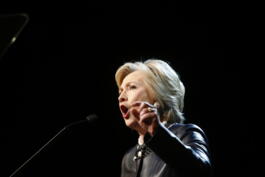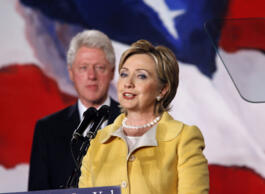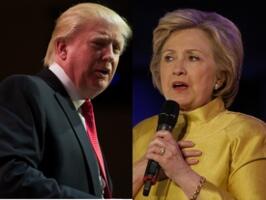Just 32% Think Hillary Clinton Won Democratic Nomination Fairly
Even a lot of Democrats are wondering if Hillary Clinton was really the choice of party voters last year following the release of a new tell-all book by Donna Brazile, former chairman of the Democratic National Committee.
A new Rasmussen Reports national telephone and online survey finds that only 54% of Likely Democratic Voters believe Clinton won last year’s Democratic presidential nomination fairly. Twenty-seven percent (27%) say the party’s electoral system was rigged against challenger Bernie Sanders, while 19% are undecided. (To see survey question wording, click here.)
Among all likely voters, just 32% now think Clinton won her party’s nomination fairly. Forty-seven percent (47%) say the Democrats’ electoral system was rigged against Sanders. Twenty-one percent (21%) are not sure.
Forty-two percent (42%) believe Clinton is less ethical than most politicians, but 18% say she is more ethical than most of her peers. Thirty-six percent (36%) rate her ethics as about the same as theirs. These perceptions are little changed from August of last year during the presidential campaign.
By comparison, only 11% of voters think Sanders is less ethical than most other politicians. Thirty-eight percent (38%) say he is more ethical. Forty percent (40%) of Democrats said in June that the Vermont senator is likely to be the party’s presidential nominee in 2020.
Brazile’s book details how the Clinton campaign had secret control over the party’s electoral apparatus during the election of 2016.
(Want a free daily e-mail update? If it's in the news, it's in our polls). Rasmussen Reports updates are also available on or Facebook.
The survey of 1,000 Likely Voters was conducted on November 5-6, 2017 by Rasmussen Reports. The margin of sampling error is +/- 3 percentage points with a 95% level of confidence. Field work for all Rasmussen Reports surveys is conducted by Pulse Opinion Research, LLC. See methodology.
The presidential primary process to choose the Democratic nominee includes the use of superdelegates, individuals selected by the party who can support any candidate at the national convention regardless of who wins their state's popular vote. Many Sanders' supporters were unhappy with this system, arguing that it gave Clinton an unfair advantage. Fifty-one percent (51%) of Democrats opposed the superdelegate system in April of last year.
Women and those under 40 are more undecided about how Clinton won the nomination than men and older voters are. They’re also less critical of her ethical standards.
But younger voters who were a key support group for Sanders are clearly conflicted. Forty-two percent (42%) of these voters believe the party system was rigged against Sanders versus 34% who say Clinton won the nomination fairly.
Blacks are more likely than whites and other minority voters to believe she won the nomination fairly. Forty-one percent (41%) of blacks say Clinton is more ethical than most politicians, a view shared by only 13% of whites and 23% of other minority voters.
A plurality (45%) of Democrats see Clinton’s ethics as about the same as most politicians, a view shared by 20% of Republicans and 42% of voters not affiliated with either major party. Thirty-one percent (31%) of voters in her own party say she is more ethical, but only nine percent (9%) of GOP voters and 13% of unaffiliateds buy into that.
Among voters who rate Clinton’s ethics as comparable to most other politicians, 40% say she won the nomination fairly; 29% think the system was rigged against Sanders, and 31% are undecided.
Sixty-one percent (61%) of all voters believe it is time for Clinton to retire from public life.
With the Clinton Foundation and Clinton’s campaign coming under increasing investigative scrutiny for their ties to Russia, just over half of voters now think something illegal was going on.
Just after the 2016 presidential election, 48% thought the election results were more a vote against Hillary Clinton than a vote for Donald Trump. Thirty-five percent (35%) said they were more a vote for Trump.
But 55% think Trump won the presidential election fairly last November.
Additional information from this survey and a full demographic breakdown are available to Platinum Members only.
Please sign up for the Rasmussen Reports daily e-mail update (it’s free) or follow us on Twitter or Facebook. Let us keep you up to date with the latest public opinion news.
The survey of 1,000 Likely Voters was conducted on November 5-6, 2017 by Rasmussen Reports. The margin of sampling error is +/- 3 percentage points with a 95% level of confidence. Field work for all Rasmussen Reports surveys is conducted by Pulse Opinion Research, LLC. See methodology.
Rasmussen Reports is a media company specializing in the collection, publication and distribution of public opinion information.
We conduct public opinion polls on a variety of topics to inform our audience on events in the news and other topics of interest. To ensure editorial control and independence, we pay for the polls ourselves and generate revenue through the sale of subscriptions, sponsorships, and advertising. Nightly polling on politics, business and lifestyle topics provides the content to update the Rasmussen Reports web site many times each day. If it's in the news, it's in our polls. Additionally, the data drives a daily update newsletter and various media outlets across the country.
Some information, including the Rasmussen Reports daily Presidential Tracking Poll and commentaries are available for free to the general public. Subscriptions are available for $4.95 a month or 34.95 a year that provide subscribers with exclusive access to more than 20 stories per week on upcoming elections, consumer confidence, and issues that affect us all. For those who are really into the numbers, Platinum Members can review demographic crosstabs and a full history of our data.
To learn more about our methodology, click here.





